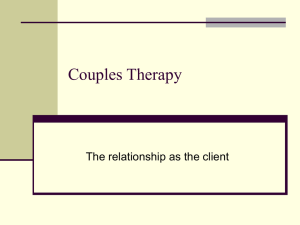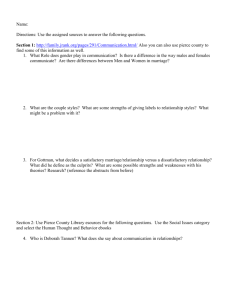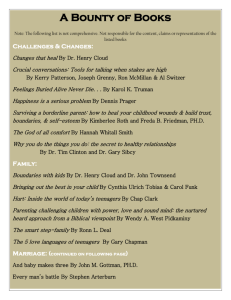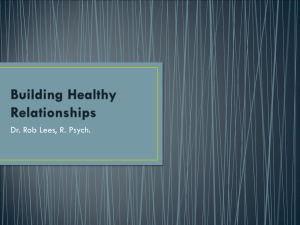File - BradleyOlson.net
advertisement
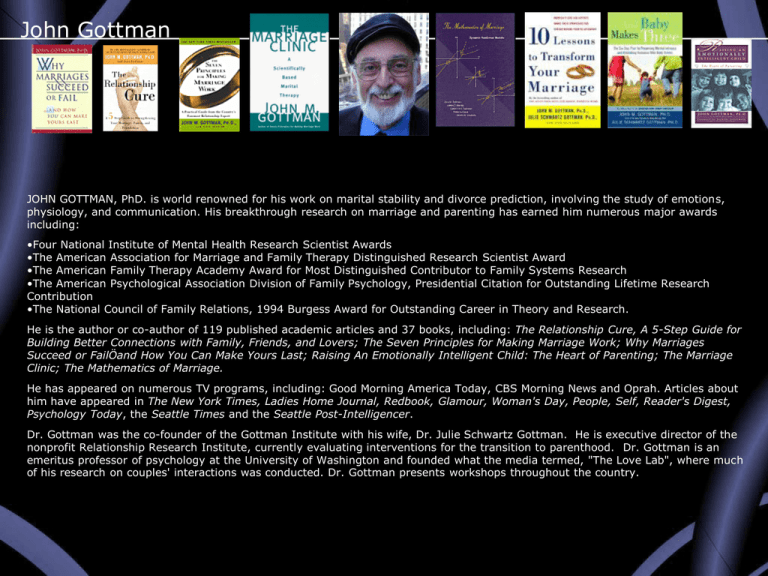
John Gottman JOHN GOTTMAN, PhD. is world renowned for his work on marital stability and divorce prediction, involving the study of emotions, physiology, and communication. His breakthrough research on marriage and parenting has earned him numerous major awards including: •Four National Institute of Mental Health Research Scientist Awards •The American Association for Marriage and Family Therapy Distinguished Research Scientist Award •The American Family Therapy Academy Award for Most Distinguished Contributor to Family Systems Research •The American Psychological Association Division of Family Psychology, Presidential Citation for Outstanding Lifetime Research Contribution •The National Council of Family Relations, 1994 Burgess Award for Outstanding Career in Theory and Research. He is the author or co-author of 119 published academic articles and 37 books, including: The Relationship Cure, A 5-Step Guide for Building Better Connections with Family, Friends, and Lovers; The Seven Principles for Making Marriage Work; Why Marriages Succeed or FailÖand How You Can Make Yours Last; Raising An Emotionally Intelligent Child: The Heart of Parenting; The Marriage Clinic; The Mathematics of Marriage. He has appeared on numerous TV programs, including: Good Morning America Today, CBS Morning News and Oprah. Articles about him have appeared in The New York Times, Ladies Home Journal, Redbook, Glamour, Woman's Day, People, Self, Reader's Digest, Psychology Today, the Seattle Times and the Seattle Post-Intelligencer. Dr. Gottman was the co-founder of the Gottman Institute with his wife, Dr. Julie Schwartz Gottman. He is executive director of the nonprofit Relationship Research Institute, currently evaluating interventions for the transition to parenthood. Dr. Gottman is an emeritus professor of psychology at the University of Washington and founded what the media termed, "The Love Lab", where much of his research on couples' interactions was conducted. Dr. Gottman presents workshops throughout the country. Have you ever thought about really being in someone else’s shoes? Not, literally, of course; being in someone else’s shoes is a euphemism for empathy, which is to know exactly how some else is feeling. That’s hard to do in a world where we taught to get in touch with our own feelings. Should we even bother to be empathic? And, if so, how can you do it? This the subject of a new book written by Drs. Les and Leslie Parrott called Trading Places. The cover of the book has a clever illustration of a shoe whose front half is a man’s shoe and the rear half is a red high heel! The Parrots point out that empathy is an extremely important characteristic to have in a good marriage. Putting yourself in your partner’s shoes (or “skin”) is a way of understanding where they are coming from. This does wonders for reducing conflict between spouses. Walt Whitman wrote, “I do not ask the wounded person how he feels, I become the wounded person.” That’s empathy - actually feeling what the other person feels. Analyzing trades places in the head, sympathizing trades places in the heart, but empathizing does both. It is to understand from both the head and the heart. So what does empathy (or “trading spaces”) do? I’m glad you asked. Here’s a list of a few things that empathy can accomplish in your marriage: •reduce criticism •eliminate nagging •make conflicts shorter •makes you better friends/partners •reinforces commitment •brings “grace” to your marriage •makes for a longer life •allows for dreams to flourish As Dr. and Dr. Parrott say: “When you accurately see any situation from another’s point of view, when you can experience it like they do, you instantly take a different approach to it“. To feel loved and nurtured, we must believe deep down that our partner is really there for us. That sounds simple, but it's far more complicated than most couples realize. Although Sally and Gary insisted that they were being attentive, they had difficulty being empathetic. That's significant: Marital researchers have found that couples who help each other weather stressful situations outside the marriage have stronger, happier relationships than those who can't. The key is empathy. Empathy isn't the same as sympathy or pity. It means being able to put yourself in another's position, to feel what they feel and see what they see, without losing yourself in the process. And it means you do all that even though you may disagree with a partner's perception, opinions, or feelings. Take 30 minutes a day, at a time that works best for both of you, to empathize with the stresses and strains you are each experiencing in other areas of your life. It can make a difference between a marriage that succeeds and one that fails. Consider: Empathy Don'ts Don't stonewall (ignore what a partner is saying). Don't minimize a spouse's concerns: "What's the big deal?" "You're always so sensitive!" Don't rush to fix the problem: "Well, if I were you I'd..." or "You should have..." Many people mistakenly believe that downplaying worries or offering advice is helpful. In fact, pat reassurances often magnify negative feelings, since they force a person to try even harder to feel acknowledged. Women especially resent a partner's interruption with solutions, preferring instead to simply vent and know that someone is really listening. Empathy Dos Do pay attention. Set aside the newspaper or catalog and turn off the TV when your partner is talking. An occasional uhhuh or nod of the head indicates you haven't zoned out. Do validate feelings. "He gave that special assignment to the new recruit? I can see why you're annoyed." Do ask questions with genuine interest. Make sure your partner knows you heard what he or she has said. "So how did you respond to him?“ Do respond with affection, understanding, and support: "I'm really sorry you have to put up with that." "Oh, sweetheart, that could happen to anyone. Don't be so hard on yourself.“ Do show support. Take your spouse's side. "I think your boss went a little overboard, too," is appropriate. "Well, you shouldn't have been late in the first place" isn't. Excerpted from Seven Secrets of a Happy Marriage: Wisdom from the Annals of "Can This Marriage Be Saved?" Ask Yourself… Is it more important to be right… or be in relationship? Communication • DANGEROUS: What's for dinner? SAFER: Can I help you with dinner? SAFEST: Where would you like to go for dinner? ULTRA SAFE: Have some chocolate. DANGEROUS: Are you wearing that? SAFER: Wow, you look good in brown. SAFEST: WOW! Look at you! ULTRA SAFE: Have some chocolate. DANGEROUS: What are you so worked up about? SAFER: Could we be overreacting? SAFEST: Here's my paycheck. ULTRA SAFE: Have some chocolate. DANGEROUS: Should you be eating that? SAFER: You know, there are a lot of apples left. SAFEST: Can I get you a glass of wine with that? ULTRA SAFE: Have some chocolate. DANGEROUS: What did you do all day? SAFER: I hope you didn't over-do it today. SAFEST: I've always loved you in that robe! ULTRA SAFE: Have some more chocolate . • • • • • • • • • • Gottman’s Marriage Tips 101 Since 1973, Dr. John Gottman has studied what he calls the "masters and disasters" of marriage. Ordinary people from the general public took part in long-term studies, and Dr. Gottman learned what makes marriages fail, what makes them succeed, and what can make marriages a source of great meaning. By examining partners’ heart rates, facial expressions, and how they talk about their relationship to each other and to other people, Dr. Gottman is able to predict with more than 90% accuracy which couples will make it, and which will not. What advice does Dr. Gottman have to offer? Below are some of his top suggestions for how to keep your marriage strong. Seek help early. The average couple waits six years before seeking help for marital problems (and keep in mind, half of all marriages that end do so in the first seven years). This means the average couple lives with unhappiness for far too long. Edit yourself. Couples who avoid saying every critical thought when discussing touchy topics are consistently the happiest. Soften your "start up." Arguments first "start up" because a spouse sometimes escalates the conflict from the get-go by making a critical or contemptuous remark in a confrontational tone. Bring up problems gently and without blame. Accept influence. A marriage succeeds to the extent that the husband can accept influence from his wife. If a woman says, "Do you have to work Thursday night? My mother is coming that weekend, and I need your help getting ready," and her husband replies, "My plans are set, and I'm not changing them". This guy is in a shaky marriage. A husband's ability to be influenced by his wife (rather than vice-versa) is crucial because research shows women are already well practiced at accepting influence from men, and a true partnership only occurs when a husband can do so as well. Have high standards. Happy couples have high standards for each other even as newlyweds. The most successful couples are those who, even as newlyweds, refused to accept hurtful behavior from one another. The lower the level of tolerance for bad behavior in the beginning of a relationship, the happier the couple is down the road. Learn to repair and exit the argument. Successful couples know how to exit an argument. Happy couples know how to repair the situation before an argument gets completely out of control. Successful repair attempts include: changing the topic to something completely unrelated; using humor; stroking your partner with a caring remark ("I understand that this is hard for you"); making it clear you're on common ground ("This is our problem"); backing down (in marriage, as in the martial art Aikido, you have to yield to win); and, in general, offering signs of appreciation for your partner and his or her feelings along the way ("I really appreciate and want to thank you for.…"). If an argument gets too heated, take a 20-minute break, and agree to approach the topic again when you are both calm. Focus on the bright side. In a happy marriage, while discussing problems, couples make at least five times as many positive statements to and about each other and their relationship as negative ones. For example, "We laugh a lot;" not, "We never have any fun". A good marriage must have a rich climate of positivity. Make deposits to your emotional bank account. If you'd like to test your relationship click on relationship quizzes. And for anyone who wants their relationship to attain its highest potential, check out our new DVD/Video Workshop for Couples, The Art & Science of Love (click here). • Copyright 2004 The Gottman Institute, Inc .
